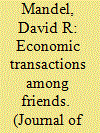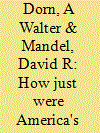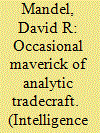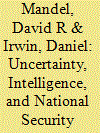|
|
|
Sort Order |
|
|
|
Items / Page
|
|
|
|
|
|
|
| Srl | Item |
| 1 |
ID:
072556


|
|
|
|
|
| Publication |
2006.
|
| Summary/Abstract |
Two experiments tested the idea that economic transactions among friends are influenced by a norm of generosity. Whereas a fairness norm ought to promote agreement in offers between buyers and sellers, a generosity norm should promote altruistic disagreements caused by sellers offering lower prices than buyers-a reversal of the well-known endowment effect. Supporting the present account, in both studies, offers among friends showed a reversal of the endowment effect. Moreover, disagreement in buying and selling offers was stronger among friends than among acquaintances, and (in study 2) the perceived generosity of offers, but not their perceived fairness, mediated this effect. Finally, both studies demonstrated that generosity is asymmetric: whereas selling offers among friends were generous by all comparative standards, buying offers were not.
|
|
|
|
|
|
|
|
|
|
|
|
|
|
|
|
| 2 |
ID:
140875


|
|
|
|
|
| Summary/Abstract |
To what degree were the wars waged by the United States ethically just? The answer is necessarily subjective, but would experts from across the political spectrum score conflicts in a similar fashion? In a survey of more than 100 international studies experts, the 18 major conflicts fought by the United States since 1900 were assessed. World War II was rated as the most just, whereas the Iraq Invasion was considered the most unjust. Respondents also scored each conflict under seven just war criteria: just cause, right intent, net benefit, legitimate authority, last resort, proportionality of means, and right conduct. The average of the criteria, the “Just War Index” (JWI), correlated strongly with the participants' measure of each conflict's overall justness, indicating the importance of the criteria. Participants who identified themselves on the political right gave higher JWI values for almost all conflicts than those on the left. The left rated seven conflicts unjust while the right found all to be just, though three only slightly so. Nonetheless, the ranking of conflicts was quite similar between the two groups. Though no conflict was deemed completely just or unjust, the US war spectrum ranged from highly “just” to highly “unjust.” The JWI approach offers a quantified and nuanced analysis of important ethical criteria—an approach that could be applied to other conflicts, including future ones.
|
|
|
|
|
|
|
|
|
|
|
|
|
|
|
|
| 3 |
ID:
171243


|
|
|
|
|
| Summary/Abstract |
Roughly a decade ago, in a commissioned report I wrote for the US National Research Council’s Committee on Behavioral and Social Science Research to Improve Intelligence Analysis for National Security, I characterized those rare and seminal contributors to analytic tradecraft – figures such as Sherman Kent, Jack Davis, and Richards Heuer – as mavericks.1 The term was meant to conjure a heroic image: mavericks are like mythical forces of good bursting upon an otherwise dreary set. They possess energy, brains and noble motives and act to save their communities while others around them are silent or worse. Notwithstanding those noble characteristics, I made the case for why intelligence communities should not choose or be forced to rely on the occasional maverick.
|
|
|
|
|
|
|
|
|
|
|
|
|
|
|
|
| 4 |
ID:
164194


|
|
|
|
|
| Summary/Abstract |
Structured analytic techniques (SATs) are intended to improve intelligence analysis by checking the two canonical sources of error: systematic biases and random noise. Although both goals are achievable, no one knows how close the current generation of SATs comes to achieving either of them. We identify two root problems: (1) SATs treat bipolar biases as unipolar. As a result, we lack metrics for gauging possible over-shooting—and have no way of knowing when SATs that focus on suppressing one bias (e.g., over-confidence) are triggering the opposing bias (e.g., under-confidence); (2) SATs tacitly assume that problem decomposition (e.g., breaking reasoning into rows and columns of matrices corresponding to hypotheses and evidence) is a sound means of reducing noise in assessments. But no one has ever actually tested whether decomposition is adding or subtracting noise from the analytic process—and there are good reasons for suspecting that decomposition will, on balance, degrade the reliability of analytic judgment. The central shortcoming is that SATs have not been subject to sustained scientific of the sort that could reveal when they are helping or harming the cause of delivering accurate assessments of the world to the policy community.
|
|
|
|
|
|
|
|
|
|
|
|
|
|
|
|
| 5 |
ID:
179157


|
|
|
|
|
| Summary/Abstract |
Intelligence analysis and national security decisionmaking are pervaded by uncertainty. The most consequential decisions that leaders make, such as whether to go to war, are mired in uncertainties not only reflecting what is unknown but also what is unknowable, such as the intentions of others who may not have made up their own minds.1 Those uncertainties not only make decisions about how to resolve international conflicts more difficult, they change the odds of going to war. Powerful countries seldom wage war to conquer weaker ones but rather to prevent them from developing breakout technologies that could threaten them in the long run.2 Such decisions are inevitably made under uncertainty, and the deeper and more vexing the uncertainties are, the more likely war is to follow as a conflict resolution strategy.
|
|
|
|
|
|
|
|
|
|
|
|
|
|
|
|
|
|
|
|
|